|
|
|
Sort Order |
|
|
|
Items / Page
|
|
|
|
|
|
|
| Srl | Item |
| 1 |
ID:
159425
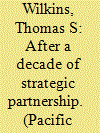

|
|
|
|
|
| Summary/Abstract |
This article argues that the creation of ‘strategic partnerships’ as an alternative form of alignment represents an effort by Tokyo, and other US-allies, to ‘decenter’ their respective security policies from their erstwhile over-dependence on Washington. By examining the nature, purpose, and dynamics of strategic partnerships more closely, and investigating the empirical case of Australia, we can gain a greater appreciation of their significance both to Japan's evolving security policy and the broader role they play in the Asia Pacific security landscape. The article argues that Australia has been the most significant and successful of Japan's new strategic partnerships to date, has therefore come to represent the template for other new alignments, and hence provides a yardstick against which their effectiveness can be measured. It concludes that while the strategic partnership certainly represents a new departure for Japanese security policy – ostensibly independent of the US-alliance – closer inspection reveals how this relationship remains fundamentally bound to the broader American-hub-and-spokes system.
|
|
|
|
|
|
|
|
|
|
|
|
|
|
|
|
| 2 |
ID:
169216
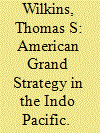

|
|
|
|
|
| Summary/Abstract |
In an era of heightened great power competition, debates about American grand strategy in the Indo-Pacific region have returned to the fore. This review essay looks at three recent volumes that directly address such debates. After introducing the concept of grand strategy, Part I reviews each of the books individually in sequence, outlining their scope, contents, and contributions. Part II then integrates the contribution of each of the volumes into a broader discussion relating to four pertinent issues: American perspectives on “Asia”; international relations (IR) theory; American strategic culture; and the rise of China, before concluding. The books under review are to differing degrees orientated toward one of the core IR theory paradigms: realism (Green), liberalism (Campbell), and constructivism/critical (Kang) approaches. As such, read together, they contribute to a multi-faceted theoretical understanding of US grand strategy in the Indo Pacific that will be of significant value to both scholars and practitioners.
|
|
|
|
|
|
|
|
|
|
|
|
|
|
|
|
| 3 |
ID:
192545


|
|
|
|
|
| Summary/Abstract |
This article revisits the conceptualisation of (regional) order in International Relations (IR) theory to illuminate key aspects of Japan’s order-building role in the Indo-Pacific. The framework is based upon a multi-dimensional understanding of regional order-building allowing for an examination of Japan’s vision for a ‘Free and Open Indo-Pacific’ (FOIP) policy ‘vision’, the challenges it faces as a secondary power, and its conduct as an emerging entrepreneurial power in the Indo-Pacific. The article’s central argument is that Japan’s order-building should be understood in the context of the country’s deeper strategic situation and, in particular, its position as a secondary, but still highly influential, power. This has implications for understanding Japan’s approach to international order and how it might deploy norm entrepreneurship in shaping the new Indo-Pacific order.
|
|
|
|
|
|
|
|
|
|
|
|
|
|
|
|
| 4 |
ID:
147574


|
|
|
|
|
| Summary/Abstract |
Canberra and Tokyo have forged an ever-closening security alignment, which they now designate as a ‘special strategic partnership’. This development has generated disquietude among some strategic analysts in Australia who have highlighted the risks entailed in pursuing deeper defense cooperation with Japan, especially if it is codified through a formal ‘alliance’ treaty. Anchored in a contending Realist logic, this article reexamines the assumptions upon which the critical assessment bases its conclusions and seeks to offer a counterpoint to such negative interpretations of the bilateral relationship. It then goes on to provide a more positive assessment of the strategic partnership, illustrating the many benefits and opportunities that deeper cooperation with Japan affords for Australia. In the process it draws attention to an alternate set of costs that could be incurred by resiling from Japan in order to ‘accommodate’ Chinese concerns. It concludes that the nature and purpose of the Australia–Japan strategic partnership requires a more nuanced understanding in order for its various costs and benefits to be subjected to a more balanced appraisal.
|
|
|
|
|
|
|
|
|
|
|
|
|
|
|
|
| 5 |
ID:
101963
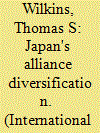

|
|
|
|
|
| Publication |
2011.
|
| Summary/Abstract |
As part of its movement toward 'normal country' status, Japan has begun to engage in a policy of alliance/alignment restructuring and diversification. This is a twin-track policy - the reconfiguration of existing allied relationships and the creation of new cooperative bilateral links. In recent years, Tokyo has deepened its ties with the United States and Australia on the one hand, while cultivating new partners such as India, as well as several Southeast Asian states. This article examines the nature and dynamics of two of the most important new strategic partnerships: India and Australia. Through a comparative analysis, it seeks to account for their formation, structure, and prospects using a specifically designed model of 'strategic partnership' drawn from Organizational Theories literature. It concludes that these strategic partnerships represent a major platform of a more robust and comprehensive security policy on the part of Japan, forged in response to a shifting international environment in the Asia-Pacific region.
|
|
|
|
|
|
|
|
|
|
|
|
|
|
|
|
| 6 |
ID:
083631
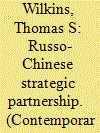

|
|
|
|
|
| Publication |
2008.
|
| Summary/Abstract |
Strategic Partnership represents a new mode of state-to-state alignment. Yet our understanding of this phenomenon is obscured by a lack of definitional precision, resulting in a frequent misapplication of the term. This article seeks to rectify this shortcoming and apply some conceptual rigor to the analysis of strategic partnerships in international relations. This is achieved through the employment of a model drawn from the field of organization studies. The model is designed to assist us in better grasping the purpose, properties, and behaviour of strategic partnerships. The Russo-Chinese strategic partnership - the exemplar of this new alignment phenomenon - is analysed as the primary case study, followed by a precursory examination of Moscow's partnerships with Iran and India. The article concludes that, if employed judiciously, the label strategic partnership is substantive and meaningful in security terms, and that many concepts borrowed from organization studies are relevant and applicable to increasing our comprehension of this often-maligned phenomenon of international politics.
|
|
|
|
|
|
|
|
|
|
|
|
|
|
|
|
| 7 |
ID:
080959
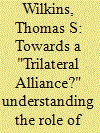

|
|
|
|
|
| Publication |
2007.
|
| Summary/Abstract |
The emerging US-Japan-Australia trilateral alignment is representative of a new archetype of "alliance" calibrated to the changed post-Cold War, post-9/11 security environment. This article considers how we might account for this new alliance formation and how we might conceptualize it. To accomplish this the article formulates an "intra-alliance politics" framework for analysis that juxtaposes competing "Realist" and "Pluralist" images of allied behavior in International Relations theory. This framework is then employed to uncover the motivations and behavioral dynamics driving the trilateral alliance seeking to reveal whether the alignment is predicated upon common "values" or sheer "expediency." It concludes that though the two different International Relations schools offer ostensibly competitive interpretations, the evidence suggests that they are in many ways complementary and mutually reinforcing. We must therefore consider the trilateral alliance an amalgam of both "expediency" and "values." The application of the intra-alliance politics framework expounded here thus enhances our understanding of this particular "alliance" and the phenomenon of "alignment" in genera
|
|
|
|
|
|
|
|
|
|
|
|
|
|
|
|
|
|
|
|
|